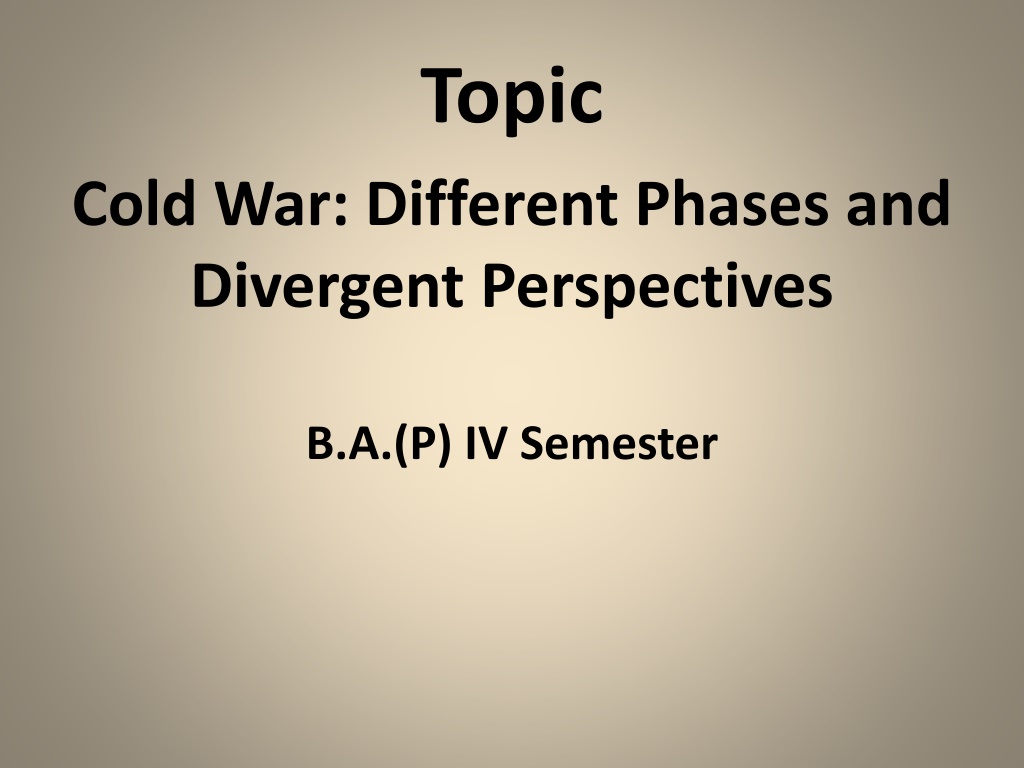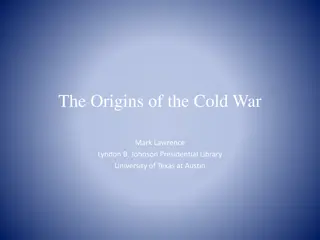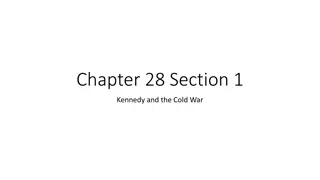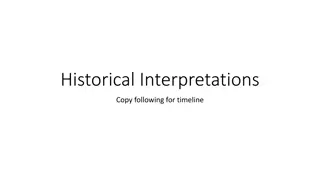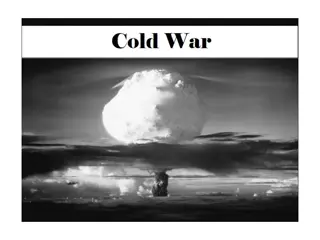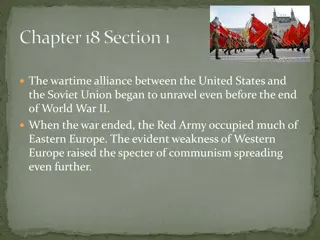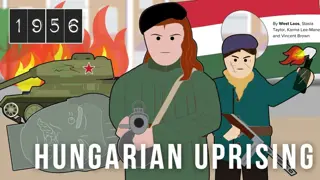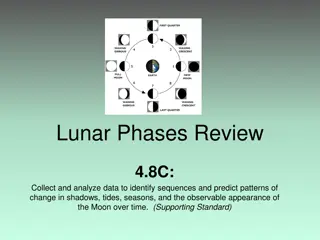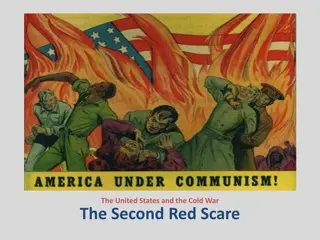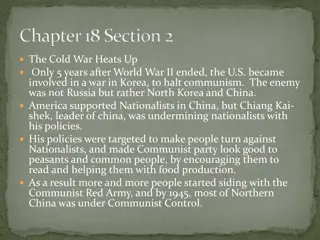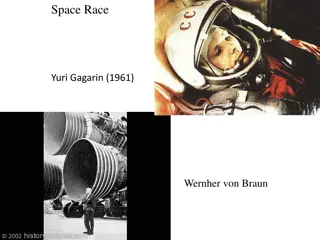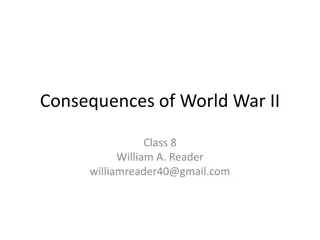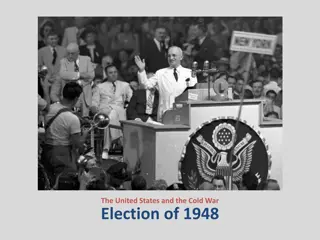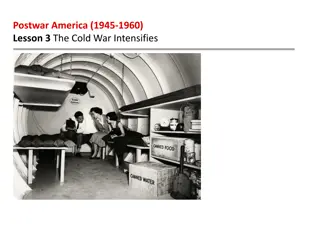Understanding the Cold War: Phases and Perspectives in B.A. IV Semester
Cold War, characterized by economic, political, and military competition between the US and Soviet Union, stemmed from ideological differences leading to global conflicts and proxy wars in the Global South, ultimately fueling neo-colonialism and neo-imperialism.
Download Presentation

Please find below an Image/Link to download the presentation.
The content on the website is provided AS IS for your information and personal use only. It may not be sold, licensed, or shared on other websites without obtaining consent from the author. Download presentation by click this link. If you encounter any issues during the download, it is possible that the publisher has removed the file from their server.
E N D
Presentation Transcript
Topic Cold War: Different Phases and Divergent Perspectives B.A.(P) IV Semester
MEANING OF COLD WAR: Cold war can be defined in different terms: In economic terms it aimed at expansion of capitalism on a global scale; politically, it aimed at the development of highly centralised state; Militarily it was preoccupied with nuclear arms race. Ideological conflict between US capitalism and Soviet communism. Due to ideological differences each super power had developed misperceptions about the others motives and policies. Each perceived its own action as virtuous and other malicious. Therefore, cold psychological factors and misperceptions, and factor became secondary. war was rooted in the ideological
IDEOLOGICAL PERCEPTIONS: Realists and Neorealists considered power vacuum in Central Europe and East Asia as the real cause of the cold war. Liberals perceived the lack of economic cooperation due to ideological differences between the two superpowers prevented any possibility of elimination of conflict between them Constructivists consider the contrasting identities of the two superpowers as the main source of conflict. Marxists interpreted cold war as western imperialism which referred to the domination of weak peripheral countries by the core. Practically, Both USSR and US acted as imperialists by using their economic and military prowess for centralisation of power on global landscape.
PERCEPTION OF GLOBAL SOUTH The superpowers cold war started in Europe but gradually engulfed all the regions of global South which immense instability and conflicts in most of the third world regions The cold war got encompassed the whole world and regions of Global South became the battleground of both the superpowers which kept most of the regions divided and Some of the regions experienced the most destructive wars in the history of the cold war: Three years war in Korea, Fifteen years war in Vietnam and Ten years war in Afghanistan These are some of the examples of superpowers proxy wars in the third world that had long term implications for their security. caused conflict ridden.
COLD WAR LED TO NEO-COLONIALISM AND NEO IMPERIALISM During the cold war period, there was hardly any region or country that was free from the domination of superpowers. The characteristic of imperialism and neo colonialism had a special place in the cold war policies of superpowers. Most of the countries in the southern world though obtained political independence, they became neo colonies or semi colonies and remained subordinate to the imperial powers neo colonialism was subordination and appropriation of new avenues of power. powers. The super based on domination, The super powers policies and political and military elites in the economically weak countries had been responsible for the facilitation of neo imperialism in these countries by means of economic and military aid.
REGIONAL HEGEMONS AND SUB-HEGEMONS: Some of the newly independent countries were cultivated as intermediaries by the capitalists to play a major regional role.. The armies and ruling class of these subordinate constituted the category of agents of respective regions. The cold war players used economic and military aid to cultivate allies in the regions against those nations not falling in the alliance system of the US. The US policy of creating regional hegemons dominant political and military hierarchy in different regions and gave rise to sub imperialism . South Africa and Australia had been supported by the US to play the role of regional hegemon in South Africa and South Pacific respectively. The emergence of regional hegemonic powers suggest that imperialism was altered but was not abolished completely. states imperialism in their gave rise to
INSTRUMENTS OF WAR: The USSR relied more on the use of force whereas the US relied on cultural, ideological, economic and diplomatic means. The USSR used military force to keep East European Countries(EEC) under its domination therefore always faced resistance to its control. The US on the contrary created consent and consensus by use of economic and ideological factors and was very successful in establishing its hegemony. The US domination was more hegemony than empire in Europe. Hegemony has been more consensual in core but laden with conflict in the periphery. The US used economic and military aid to cultivate friendship with countries in different parts of the world as it found this strategy more cost effective than fighting direct wars to contain or oust Soviet occupation in any country.
COLD WAR AND THIRD WORLD CONFLICTS: Both US and USSR sought allies in the third world on the basis of economic, political and military superpowers cold war politics, most of the African and Asian countries became victim of their domination in the initial period of their independence. Therefore cold war had inadvertent impact on their socio-economic and political conditions of these countries causing serious challenge to the very fabric of their state system. means. Due to the COLD WAR IN SOUTH ASIA The ideological difference between the US and India was the main source of contention between the two. US perception was any country not allied to the US belonged to the other camp. Kashmir issue between India and Pakistan had been exploited by the practitioners of cold war which left the region in turmoil and conflicting situation which is still haunting the South Asian region.
REASONS OF EMERGENCE OF COLD WAR AND ITS IMPACT ON THE THIRD WORLD Various developments and factors contributory to the evolution and development of cold war: Development and use of the atom bomb against Japan; Ideological conflict Misperceptions about each other; Soviet expansionist move in Europe after the end of the second world war, Kennan s policy of containment Arms race The US steps to strengthen western economic and military position to counter Soviet threat, Alliance system and emergence of bipolar world by creation of NATO and Warsaw Proxy wars: Korean war, Cuban missile crisis, the Vietnam war and the Afghanistan war - both super powers fought restrained and limited war but implicated the socio- political and economic systems of these countries adversely and had long term implications for the peace and security of these nations and their respective regions.
DIFFERENT PHASES OF COLD WAR: The world had gone through the structural changes due to the cold war between US and USSR. The cold war entered the real dangerous phase in 1947 after Truman Doctrine and Marshall Plans had been introduced to extend economic aid to Greece and Turkey and the west European countries respectively. It was felt that the economic aid will lead to economic and political integration of Europe under the US leadership. First Phase-1950: The Korean War 1950s was the first incident of expansion of superpower cold war in Asia. The Korean War began with communists diplomatic and military support to North Korea to invade South Korea by crossing the 38th parallel dividing line between North and South Korea. Korean war in which both super powers (USA and USSR) were involved by proxy. It which gave rise to the concept of limited and restrained war.
Soviet countries: The USSR adopted a new approach towards non-communist countries in the third world. The Soviet aim in establishing relations in the third world region- Africa, Asia and Latin America was not to establish communist governments but to disentangle them from the control of the US and its allies. expansionism in non-communist-third world Suez Crisis,1956: The cold war was shifted to Africa when Egypt imposed blockade on Suez Canal. On 26 July 1956, Egypt s President Gamal Abdel Nasser announced the nationalisation of Suez Canal. Both GB and France protested as it was the shortest trading route as well as it was internationalised water ways. The matter was taken to the UN but remained unresolved. Therefore to lift the Egyptian blockade on Suez, GB, France and Israel joined hands to attack Egypt. In the UN, the US instead of supporting its NATO allies asked them to withdrawal from the war.
Second Phase-1960s: Cuban missile crisis which was only a crisis but brought the entire world on the brink of nuclear war. It was the climax period of cold war which gave rise to the concept of detente. Vietnam war: was a proxy war where US got involved in undeclared war for about 15 years and could not win despite being the most powerful country fighting a small country using the strategy of guerrilla warfare. The defeat in Vietnam gave rise to no more no Vietnam in the US foreign policy. The Us decided to create friends on the borders of USSR to contain and fight it on behalf of US. Third Phase 1970s-1980s: The US mood of weariness after the Vietnam war had detente. expedited the process of
End of Dtente Detente was short lived due to the Soviet expansionist policies. During this period the USSR tried to establish its influence in Africa and West Asia. The Soviet action of expansionism in Ethiopia, Angola, Nicaragua and Afghanistan was contradictory to the essence of detente. The Soviet Afghanistan(1979) was perceived as its attempt to proliferate its influence to West Asia. In order to out Soviets from Afghanistan, insurgents in Afghanistan to oust Soviets from there. military occupation of the US supported
CONCLUSION In the perspective of global South the cold war competition had been proved most disastrous for the third world countries. Due to cold war politics in their regions, global South suffered from the deficit of good governance, development and human security which in turn is giving rise to internal instability, insurgencies and civil war situations ,which in turn threatens the very fabric of the state structure in these countries.
REFERENCES Jindal, Nirmal, eds., 2020, International Relations: Theory and Practice, Delhi: SAGE Baylis, John, Steve Smith and Patricia Owens. 2011. The Globalization of World Politics: An Introduction to International Politics. 5th ed. New York : Oxford Press.
